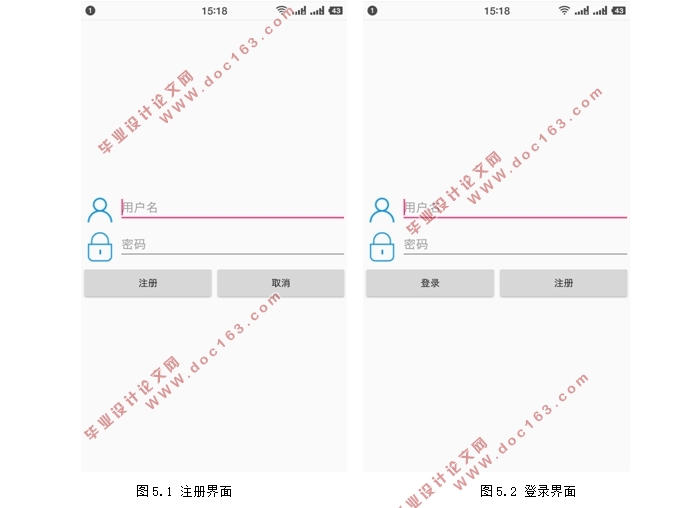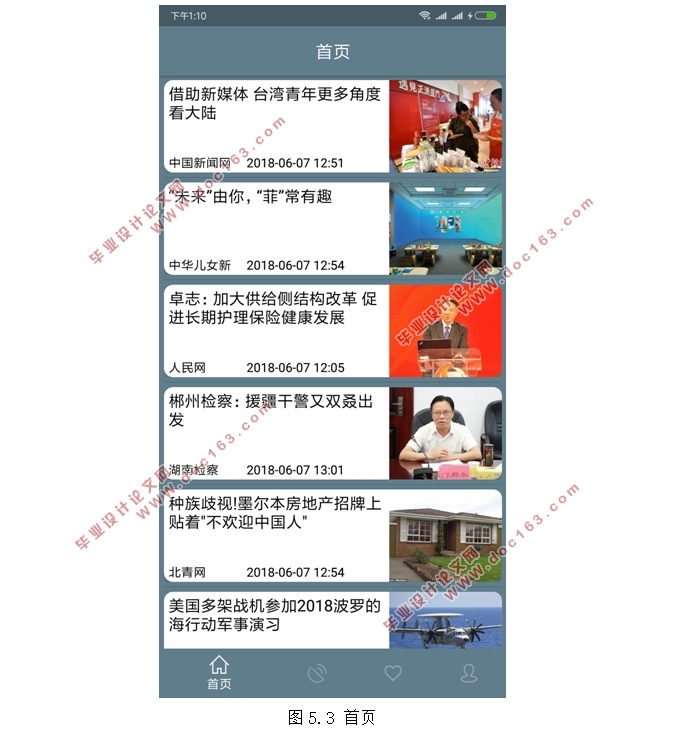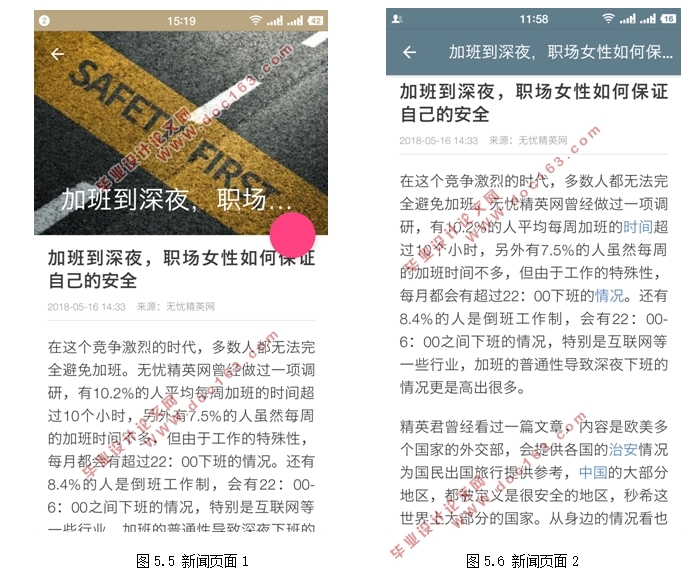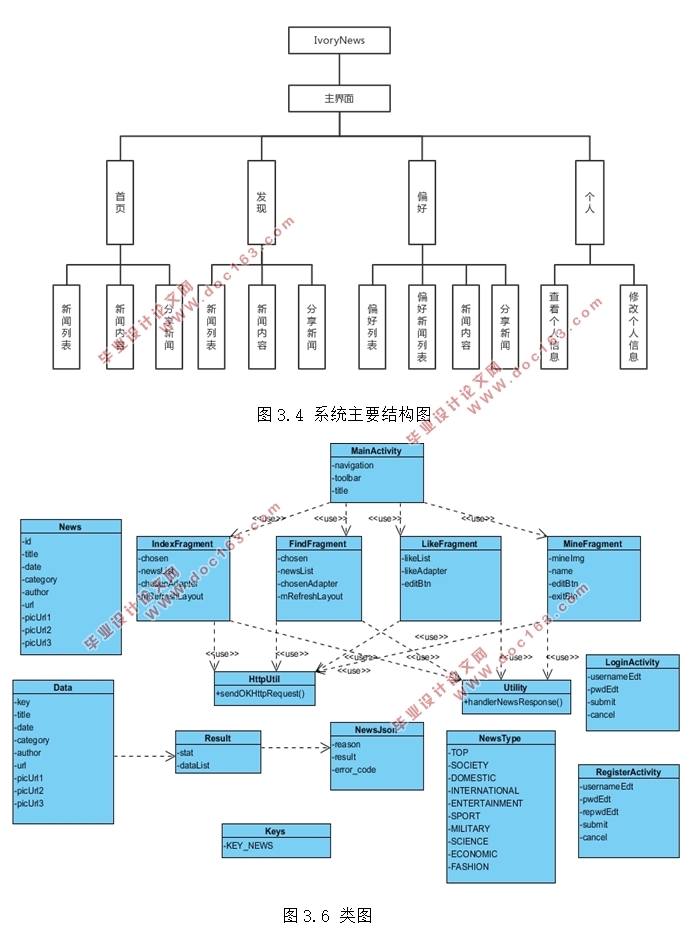基于安卓Android的定制新闻资讯APP软件设计(Android studio)

1.无需注册登录,支付后按照提示操作即可获取该资料.
2.资料以网页介绍的为准,下载后不会有水印.资料仅供学习参考之用.
密 惠 保
基于安卓Android的定制新闻资讯APP软件设计(Android studio)(论文12600字,程序代码)
摘要:本文阐述在移动互联网下,基于Android平台的融入算法的新类型资讯APP的设计与实现。系统使用Java语言,Android Studio开发。本APP分为前端和后端两个主要模块。前端为APP主要UI(User Interface)及功能界面,后端实现与前端的数据交互、存储。后端分为Bmob云服务器部分和API接口部分,服务器部分存储用户信息及相关设置;API部分通过接口获取资讯。利用聚合数据平台的资讯类API接口获取的数据作为前端的数据。Android客户端的数据的保存在SQLite数据库。本文详细论述整个应用的开发过程,介绍其主要功能,并提出了下一步的工作计划。
关键词:Android;Bmob云;API接口;定制资讯;SQLite
Design and Implementation of Customized Information Software Based on Android
Abstract: This paper describes the design and implementation of a new type of information APP based on Android platform for mobile Internet. The system is developed using the Java language and Android Studio. This APP is divided into two main modules, the front end and the back end. The front end is APP, which is mainly UI and function interface. The back end realizes data interaction with the front end and storage. The back end is divided into Bmob cloud server part and API interface part. The server part stores user information and related settings; API part obtains information through interface. The data obtained from the information class API interface of the aggregated data platform is used as the front end data. The data of the Android client is stored in the SQLite database. This paper elaborates the whole application development process, introduces its main function, and puts forward the next work plan. [来源:http://think58.com]
Key words: Android;Bmob;API;Customized Information;SQLite
功能需求
用户使用本应用有查看新闻列表、查看新闻内容、查看兴趣标签、修改兴趣标签、查看个人信息和修改个人信息等需求,具体功能需求如下:
1.用户注册和登录接口。
2.用户修改密码功能。
3.用户个人信息展示页面。
4.根据用户兴趣挑选出的新闻资讯的展示列表。
5.点击新闻列表中的新闻后,进入新闻详细内容的展示页面。
6.对新闻的分享。
7.展示用户偏好的页面。
8.用户更改偏好的功能。
9.通过偏好可以查看各个兴趣标签相关的新闻资讯。
10.展示用户兴趣标签之外的新闻资讯的发现页面。
论文的组织结构
第一部分:绪论。主要描述移动互联网时代数字新闻的背景及其利弊,从中分析出定制类资讯的必要性。同时说明本文的主要内容,要解决的问题及完成的工作。
第二部分:技术支持。主要描述本应用的技术支持,介绍开发过程中使用到的技术并阐述其在应用开发过程中的功能。
第三部分:系统概述。这部分进行详细的需求分析,阐述系统具体架构,简要介绍系统功能。从功能性需求分析和非功能性需求分析入手,通过用例图对本应用进行全面的需求分析。 [资料来源:http://THINK58.com]
第四部分:系统设计。通过对Android客户端设计、服务端设计、数据库设计和系统结构设计进行详细全面的说明。
第五部分:系统实现。该部分对本应用各个关键功能及页面做出展示,并描述实现原理并给出部分关键代码。
第六部分:结束语。对本文进行了总结,并对系统的进一步完善提出建议。




目 录
[来源:http://think58.com]
1 绪论 1
1.1 课题背景和意义 1
1.2 主要内容 1
1.3 论文的组织结构 1
1.4 本章小结 2
2 技术支持 2
2.1 Android 2
2.1.1 Android的软件栈 3
2.1.2 Android的基本架构 3
2.2 Bmob云 4
2.3 OKHttp 4
2.4 SQLite和Litpal 4
2.5 Glide图片框架 4
2.6 本章小结 5
3 系统概述 5
3.1 需求分析 5
3.1.1 功能需求 5
3.1.2 非功能需求 6
3.2 系统架构 6
3.3 系统功能 7
3.4 系统流程图 8
3.5 类图 9
3.6 本章小结 9
4 系统设计 9
4.1 功能模块设计 9
4.1.1 视图部分 10
4.1.2 逻辑部分 11
4.1.3 工具部分 11
4.2 功能模块说明 11
4.2.1 登录模块 11
4.2.2 新闻列表模块 12
4.2.3 新闻内容模块 13
4.2.4 兴趣标签模块 13
4.2.5 个人信息模块 13
4.2.6 数据筛选模块 14
4.3 序列图 14
4.3.1 注册序列图 14
4.3.2 登录序列图 15
4.3.3 新闻列表序列图 15
4.3.4 兴趣标签序列图 16
4.4 状态图 16
4.4.1 展示新闻列表状态图 16
4.4.2 展示兴趣标签状态图 17
4.5 数据库设计 17
4.6 系统结构 18
4.7 本章小结 18
5 系统实现 19
5.1 Android客户端的实现 19 [资料来源:http://THINK58.com]
5.1.1 注册和登录 19
5.1.2 首页 20
5.1.3 发现页面 20
5.1.4 新闻页面 21
5.1.5 查看兴趣标签 22
5.1.6 查看个人信息 23
5.2 后端的实现 24
5.2.1 连接Bmob云数据库 24
5.2.2 连接SQLite数据库 25
5.2.3 连接聚合数据API接口 25
5.2.4 数据库实现 25
5.3 本章小结 27
6 结束语 27
参考文献: 27
致 谢 29 [资料来源:THINK58.com]
上一篇:基于安卓Android的备忘录系统APP的设计(Eclipse)
下一篇:基于安卓Android的汽车4S店服务软件APP设计(Android studio,MySQL)
